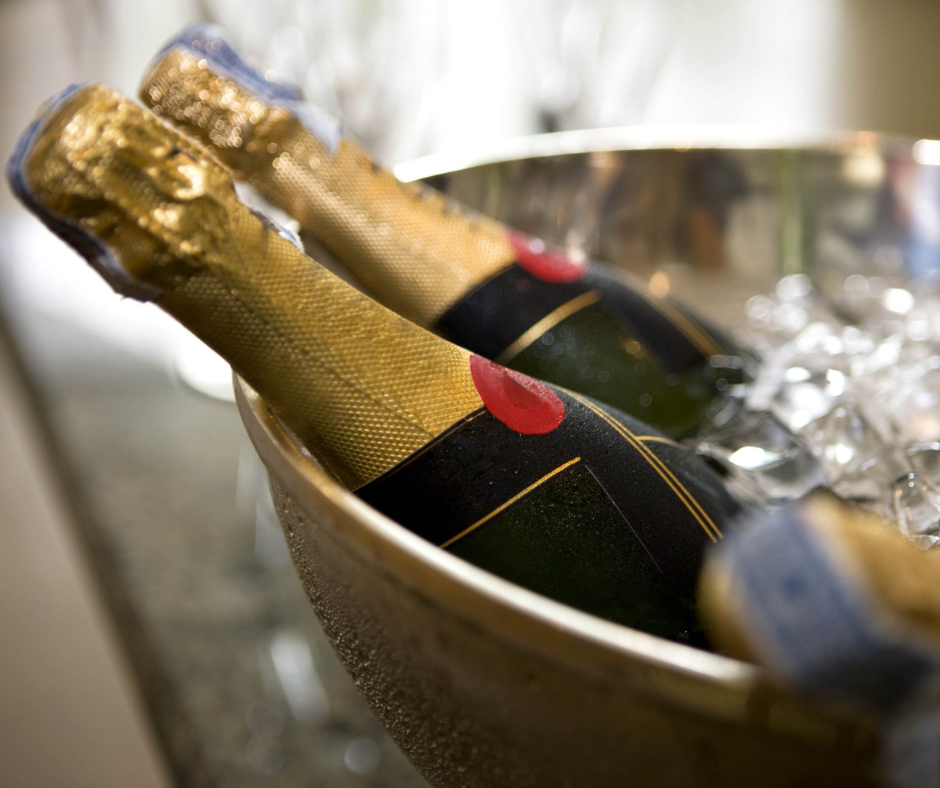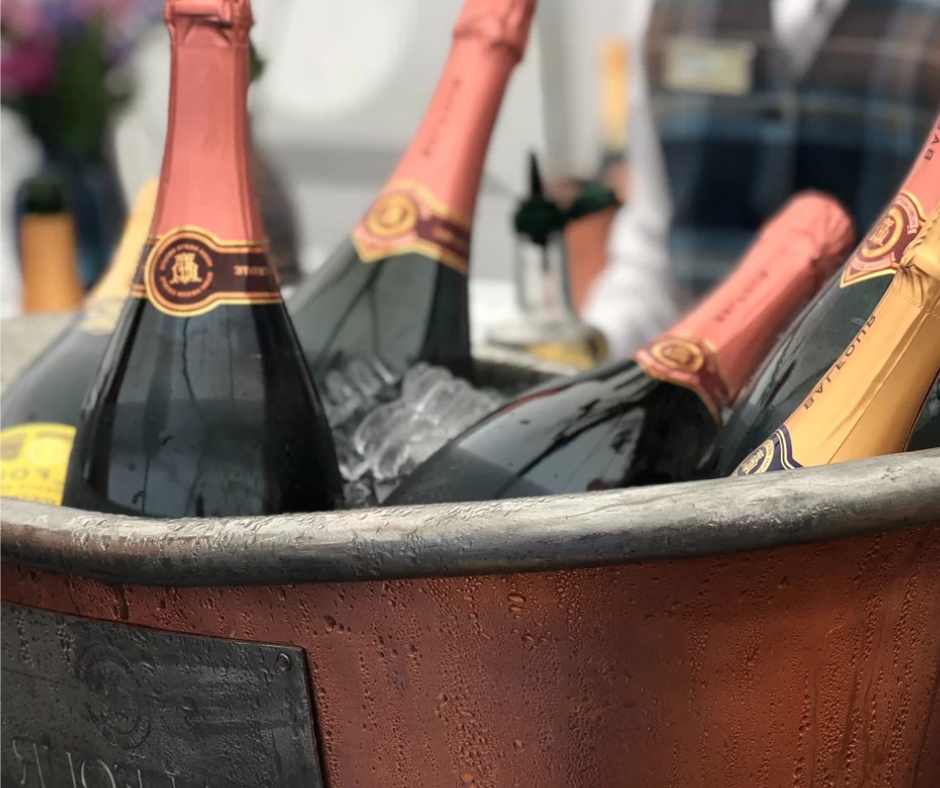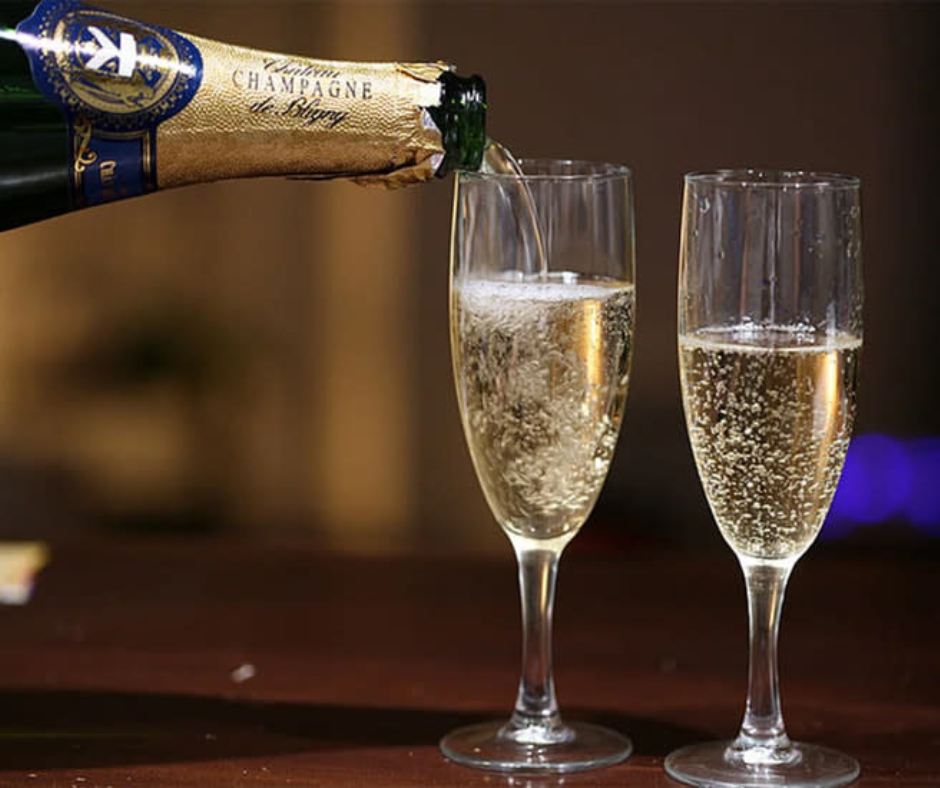Introduction
Champagne is often associated with celebration, elegance, and luxury. But have you ever wondered, ‘How Long Does Champagne Last?‘ Understanding the lifespan of champagne can help you make the most of this bubbly beverage and ensure that you enjoy it at its best.

Understanding The Lifespan Of Champagne
Champagne is known for its sparkling and refreshing taste, thanks to the carbon dioxide trapped in the bottle during fermentation. However, champagne has a limited lifespan, like any other food or drink.
Storage plays a crucial role in preserving the quality and taste of champagne. Proper storage conditions can help extend the lifespan of champagne. The ideal storage temperature for champagne is between 45°F and 55°F (7°C and 13°C). Keeping the champagne away from direct sunlight, heat sources, and temperature fluctuations is important. Storing the bottle in a cool, dark place, such as a cellar or refrigerator, can help maintain its quality for longer.
Vintage champagne, which is made from grapes harvested in a specific year, has the potential to age and develop complex flavors over time. These champagnes can last for decades if stored correctly. On the other hand, non-vintage champagne is typically meant to be consumed within a few years of its release.
Once opened, champagne starts to lose its fizz and freshness. To prolong its lifespan after opening, it is important to seal the bottle tightly with a champagne stopper or a cork. Placing the bottle in the refrigerator can also help slow the oxidation process. However, consuming the opened bottle within 1-3 days is best to enjoy its optimal taste.
Here’s a table to summarize the lifespan of champagne to answer ‘How Long Does Champagne Last?’
| Champagne Type | Lifespan |
|---|---|
| Vintage Champagne | It can last for decades if stored correctly |
| Non-Vintage Champagne | Meant to be consumed within a few years of its release |
| Once Opened | Best consumed within 1-3 days of opening |
In conclusion, understanding the lifespan of champagne can help you make the most of this exquisite beverage. By storing it properly and consuming it within the recommended time frame, you can enjoy the effervescence and unique flavors of champagne. So, raise a glass and toast to the bubbly brilliance of champagne!
Factors Affecting Champagne’s Lifespan
Storage Conditions
How you store your champagne is crucial in determining ‘How Long Does Champagne Last?’. Proper storage conditions can significantly extend its lifespan. Here are some key factors to consider:
- Temperature: Champagne is sensitive to temperature fluctuations. It is best to store it in a cool and stable environment, ideally between 45°F and 55°F (7°C and 13°C). Avoid storing it in places subject to extreme temperature changes, such as near ovens or windows.
- Humidity: High humidity levels can cause the wine labels to peel off and potentially mold growth. Conversely, low humidity can dry out the cork, leading to oxidation. Aim for a humidity level of around 70% to keep the cork moist and maintain the quality of the champagne.
- Light: Champagne should be stored in a dark place. Light, especially sunlight, can degrade the wine and cause premature aging. Exposure to UV rays can also negatively impact the flavor and aroma of the champagne. Consider using a wine cellar or a dark closet for storage.
- Vibration: Vibrations can disturb the sediment in the champagne, affecting its taste and quality. Avoid storing it near appliances or areas with a lot of movement or vibrations, such as the laundry room or a busy hallway.
Type Of Champagne
The type of champagne you have will also influence its lifespan. Here are some considerations:
- Vintage champagne: Vintage champagne is made from grapes harvested in a single year and requires aging in the bottle. These champagnes can improve with age and have a longer lifespan, typically 8 to 20 years.
- Non-vintage champagne: Non-vintage champagne is a blend of wines from different years. It is typically lighter and fresher, meant to be consumed within a few years. The lifespan of non-vintage champagne is generally around 3 to 5 years.
- Prestige cuvées: Prestige cuvées are high-end champagnes produced by renowned houses. These champagnes are often aged for several years before release and can age gracefully for 20 years or more.
- Storage method: How and where you store your champagne will also impact its lifespan. As mentioned in the previous section, proper storage is essential to preserve and extend the champagnes’ quality and longevity.
Remember, these are general guidelines, and individual bottles may vary. It is always a good idea to consult with experts or refer to the recommendations provided by the champagne producer. By paying attention to storage conditions and understanding the characteristics of your champagne, you can ensure its optimal lifespan and enjoy it at its best.

How Long Does Champagne Last?
Whether you have a bottle of champagne tucked away for a special occasion or are simply curious about the lifespan of this bubbly beverage, understanding ‘How Long Does Champagne Last?’ can be quite useful. Let’s dive into unopened champagne’s shelf life and vintage champagnes’ aging potential.
Shelf Life Of Unopened Champagne
Unopened champagne can last for several years if stored properly. Generally, non-vintage champagnes are designed to be enjoyed within 3-5 years of bottling. This type of champagne is crafted to maintain its freshness and fruitiness over a relatively short period.
However, vintage champagnes, made from grapes harvested in a specific year, can have a longer shelf life. Well-preserved vintage champagnes can age gracefully for 10-15 years or even longer. Over time, they develop complex flavors and aromas, offering a unique tasting experience.
To ensure unopened champagne’s longevity, storing it in a cool, dark place with consistent temperature and humidity levels is crucial. Extreme temperature fluctuations can negatively impact the flavor and quality of the champagne.
Aging Potential Of Vintage Champagnes
Vintage champagnes have tremendous aging potential, evolving and maturing over time. The aging process allows the champagne to develop more profound and complex flavors, enhancing its overall quality.
When storing vintage champagnes for aging, it is essential to lay the bottle horizontally to keep the cork moist and prevent it from drying out. A dry cork can lead to oxidation and spoilage of the champagne.
It is worth noting that not all champagnes benefit from extensive aging. Non-vintage champagnes are generally best enjoyed soon after purchase, crafted for immediate consumption.
In summary, unopened champagne can last several years, with vintage champagne having a longer aging potential than non-vintage champagne. Proper storage conditions are crucial for maintaining the quality and flavors of champagne over time. So, whether you are savoring a bottle of vintage champagne or enjoying a recently released non-vintage selection, each sip will surely bring a touch of bubbly brilliance to your celebrations.
How Long Does Opened Champagne Last?
Have you ever wondered, ‘How Long Does Champagne Last once it’s been opened?’ Whether you’re celebrating a special occasion or enjoying a glass of bubbly, knowing how long you have before it goes flat or loses its flavor is important. In this article, we’ll explore the lifespan of opened champagne and discuss the factors that can affect its longevity.
The Deterioration Of Fizziness
When you pop the cork and pour yourself a glass of champagne, you’ll first notice the effervescence and fizziness. However, over time, this fizziness will start to fade. If stored properly, Champagne typically retains its bubbles for about 1-3 days after being opened. To maintain the fizziness for as long as possible, it’s important to record the bottle tightly and store it in the refrigerator. This will help slow down the process of carbonation loss.
The Impact On Taste And Flavor
While the fizziness of champagne is certainly important, the taste and flavor are equally vital. Once opened, champagne will gradually lose its fresh and vibrant flavors. This process is known as oxidation. Oxidation can happen quickly, especially if the bottle is not sealed tightly or the champagne is exposed to air for an extended period. Generally, it is recommended to consume opened champagne within 3-5 days to enjoy its optimal taste and flavor.
It’s worth noting that not all champagnes are created equal in terms of their lifespan. Vintage champagnes tend to have a longer shelf life than non-vintage ones. The sugar content in the champagne can also affect how long it stays fresh. Champagne with higher sugar levels may last longer compared to drier varieties.
In conclusion, if stored properly, opened champagne can retain its fizziness for 1-3 days and its optimal taste and flavor for 3-5 days. To extend its lifespan, tightly recork the bottle and store it in the refrigerator. And remember, vintage champagnes and those with higher sugar levels may have a longer shelf life. So, savor it while it’s still fresh and lively the next time you enjoy a glass of bubbly!

Best Practices For Storing Champagne
Keeping Champagne In The Right Conditions
The key to preserving the lifespan of champagne lies in proper storage. Here are a few tips to ensure your bubbly stays fresh and delicious:
- Temperature: Champagne should be stored in a cool and consistent environment, ideally between 45°F and 55°F (7°C and 13°C). Avoid exposing it to extreme temperatures, affecting its quality and taste.
- Light: Champagne bottles should be kept from direct sunlight or strong artificial light. UV rays can break down champagne compounds, affecting flavor and color.
- Humidity: Maintain a humidity level of around 70% in the storage area. Too much humidity can cause mold growth, while too little can dry out the cork and lead to oxidation.
- Position: Store champagne bottles horizontally. This keeps the cork moist and prevents it from drying out, maintaining a proper seal.
Tips For Preserving Opened Champagne
Once you’ve popped the cork, there are a few ways to keep your opened champagne fresh for a little longer:
- Refrigeration: Store opened champagne in the fridge. The cold temperature slows the oxidation process, helping preserve its flavors and bubbles.
- Seal it tightly: Seal the opened bottle tightly with a champagne stopper or airtight closure to prevent carbonation loss.
- Limit exposure to air: Pour only what you need and avoid excessive exposure. The more air the champagne comes in contact with, the quicker it will lose its bubbles.
- Dates: Keep track of when you opened the champagne. It’s best to consume it within 1-3 days of opening for optimal taste and quality.
Remember, while champagne does have a lifespan, it’s important to note that it doesn’t suddenly become undrinkable after a certain period. The taste and quality might change gradually, and older bottles may lose some of their effervescence.
In summary, by storing champagne in the right conditions and following these preservation tips, you can extend the lifespan of your bubbly and continue to enjoy its brilliance. Cheers!
FAQ: How Long Does Champagne Last – Bubbly Brilliance: The Lifespan of Champagne
Q: What contributes to the lifespan of champagne?
A: Several factors contribute to the lifespan of champagne, including its type, quality, and storage conditions.
Q: How long can high-quality brut champagne last?
A: High-quality brut champagne, if properly stored, can last up to 5 years or even longer.
Q: Can vintage champagnes age gracefully?
A: Yes, vintage champagnes have the potential to age gracefully for even longer than 5 years.
Q: Are all champagnes meant to be aged?
A: No, not all champagnes are meant to be aged. Non-vintage varieties, such as Moët & Chandon, are best enjoyed within 3-5 years of purchase.
Q: Does the clock start ticking on the freshness of champagne once it’s opened?
A: Yes, once a bottle of champagne is opened, the freshness starts to decline. It is best to consume it within a day or two.
Q: What does the ability of champagne to age gracefully symbolize?
A: The ability of champagne to age gracefully showcases its timeless allure and serves as a testament to the enduring bond between the giver and receiver.
Q: How long does unopened champagne last?
A: The lifespan of unopened champagne can vary depending on several factors, such as the type and quality of the champagne. However, if stored correctly, unopened champagne can last several years.
Q: What are some factors that affect the lifespan of unopened champagne?
A: Factors that affect the lifespan of unopened champagne include storage temperature, humidity, light exposure, and the quality of the cork seal.
Q: How should champagne be stored to maximize its lifespan?
A: Champagne should be stored in a cool (around 50°F or 10°C), dark place, away from sunlight and temperature fluctuations. It is best to store it horizontally to keep the cork moist and the seal intact.
Q: Can the lifespan of unopened champagne be extended with proper storage?
A: Yes, proper storage conditions can help extend the lifespan of unopened champagne by maintaining its freshness and preserving its flavors.
Conclusion
Now you should know the answer to ‘How Long Does Champagne Last?’. Champagne is a luxurious and celebratory drink that deserves to be enjoyed at its best. By understanding the lifespan of champagne and implementing proper storage techniques, you can ensure that every bottle you open is full of bubbly brilliance.
Enjoying Champagne At Its Best And Avoiding Waste
To fully appreciate the flavors and effervescence of champagne, it’s important to consume it within a certain timeframe. Here are a few guidelines to help you enjoy your champagne to the fullest:
- Fresh is Best: Champagne is at its best when young and fresh. Most non-vintage champagnes are meant to be consumed within 3-5 years of release. Vintage champagnes, on the other hand, can age for a longer period, depending on the specific bottle.
- Proper Storage: To maintain the quality of your champagne, store it in a cool, dark place away from sunlight, heat, and fluctuations in temperature. The ideal temperature for storing champagne is around 55°F (13°C). Avoid storing champagne in the refrigerator for extended periods, as the vibrations and low humidity can negatively impact its quality.
- Refrigeration: If you’re not planning to consume your bottle of champagne within a few days, it’s best to refrigerate it. Champagne can be stored in the refrigerator for up to a week without significant loss in quality. Keep it in the main compartment, as the door is subject to temperature fluctuations.
- Seal It Properly: Once you open a bottle of champagne, use a champagne stopper to seal it tightly. This will help preserve the carbonation and prevent unnecessary waste. Avoid using regular wine stoppers, as they may be unable to maintain the pressure of the champagne.
- Champagne Preservation Systems: If you frequently find yourself with leftover champagne, you may consider investing in a champagne preservation system. These systems help maintain the pressure and freshness of the wine, allowing you to enjoy it over several days.
Following these guidelines ensures that your champagne remains fresh, flavorsome, and at its sparkling best. Remember, champagne is a delicate and perishable beverage, so treat it carefully to savor its exquisite taste and effervescence. Cheers to celebrating life’s special moments with a glass of bubbly brilliance!

Andre Lotz immigrated to the United States from South Africa almost 20 years ago. Still, he didn’t feel truly at home until he settled in Mobile—a city that reminds him of his childhood home of Fish Hoek on the southern cape of Africa.

